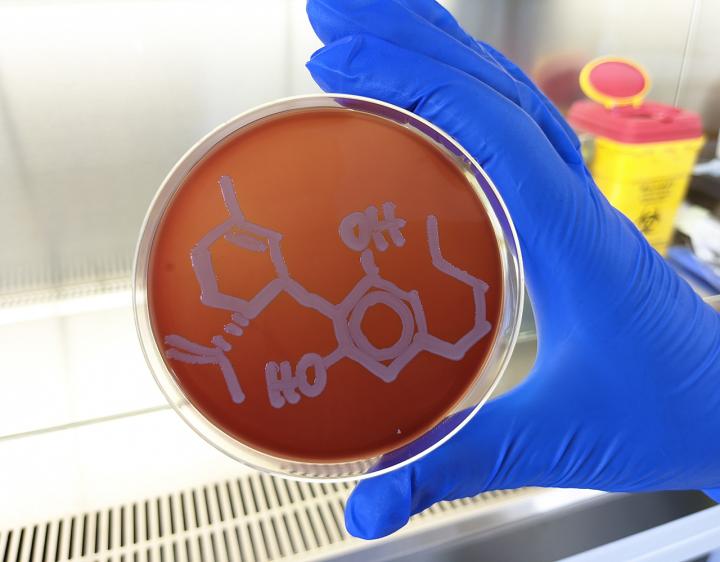The main nonpsychoactive component of cannabis has been shown to kill Gram-negative bacteria for the first time

Credit: Institute for Molecular Bioscience, University of Queensland.
Synthetic cannabidiol, better known as CBD, has been shown for the first time to kill the bacteria responsible for gonorrhoea, meningitis and legionnaires disease.
The research collaboration between The University of Queensland and Botanix Pharmaceuticals Limited could lead to the first new class of antibiotics for resistant bacteria in 60 years.
The UQ Institute for Molecular Bioscience’s Associate Professor Mark Blaskovich said CBD – the main nonpsychoactive component of cannabis – can penetrate and kill a wide range of bacteria including Neisseria gonorrhoeae, which causes gonorrhoea.
“This is the first time CBD has been shown to kill some types of Gram-negative bacteria. These bacteria have an extra outer membrane, an additional line of defence that makes it harder for antibiotics to penetrate,” Dr Blaskovich said.
In Australia, gonorrhoea is the second most common sexually-transmitted infection and there is no longer a single reliable antibiotic to treat it because the bacteria is particularly good at developing resistance.
The study also showed that CBD was widely effective against a much larger number of Gram-positive bacteria than previously known, including antibiotic-resistant pathogens such as MRSA (methicillin-resistant Staphylococcus aureus) or ‘golden staph’.
Dr Blaskovich said cannabidiol was particularly good at breaking down biofilms–the slimy build-up of bacteria, such as dental plaque on the surface of teeth–which help bacteria such as MRSA survive antibiotic treatments.
Dr Blaskovich’s team at the Centre for Superbug Solutions mimicked a two-week patient treatment in laboratory models to see how fast the bacteria mutated to try to outwit CBD’s killing power.
“Cannabidiol showed a low tendency to cause resistance in bacteria even when we sped up potential development by increasing concentrations of the antibiotic during ‘treatment’.”
“We think that cannabidiol kills bacteria by bursting their outer cell membranes, but we don’t know yet exactly how it does that, and need to do further research.
The research team also discovered that chemical analogs – created by slightly changing CBD’s molecular structure–were also active against the bacteria.
“This is particularly exciting because there have been no new molecular classes of antibiotics for Gram-negative infections discovered and approved since the 1960s, and we can now consider designing new analogs of CBD within improved properties.”
Vince Ippolito, the President and Executive Chairman of Botanix, said the research showed vast potential for the development of effective treatments to fight the growing global threat of antibiotic resistance.
“Congratulations to Dr Blaskovich and his team for producing this significant body of research–the published data clearly establishes the potential of synthetic cannabinoids as antimicrobials,” Mr Ippolito said.
“Our Company is now primed to commercialise viable antimicrobial treatments which we hope will reach more patients in the near future. This is a major breakthrough that the world needs now.”
Dr Blaskovich said collaborating with Botanix has sped up the research, with Botanix contributing formulation expertise that has led to the discovery that how cannabidiol is delivered makes a huge difference in its effectiveness at killing bacteria.
The collaboration has enabled Botanix to progress a topical CBD formulation into clinical trials for decolonisation of MRSA before surgery.
“Those Phase 2a clinical results are expected early this year and we hope that this will pave the way forward for treatments for gonorrhoea, meningitis and legionnaires disease.
“Now we have established that cannabidiol is effective against these Gram-negative bacteria, we are looking at its mode of action, improving its activity and finding other similar molecules to open up the way for a new class of antibiotics.”
###
This research has been published in Communications Biology.
Explainer video – https:/
Interview footage and lab b-roll footage available on request.
Media Contact
Dr Jane Ilsley
[email protected]
Related Journal Article
http://dx.




